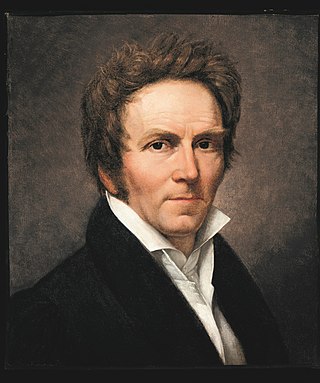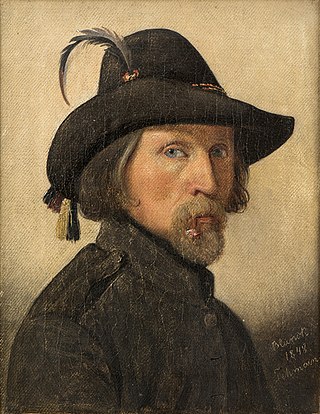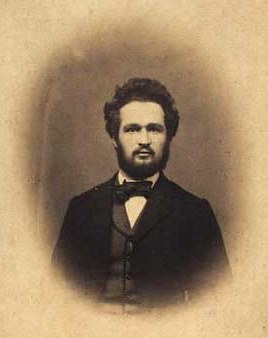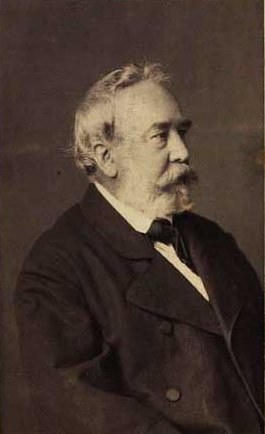
Christoffer Wilhelm Eckersberg was a Danish painter. He was born in Blåkrog in the Duchy of Schleswig. He went on to lay the foundation for the period of art known as the Golden Age of Danish Painting, and is referred to as the "Father of Danish painting".

Samuel Bell Waugh was a 19th-century American portrait, landscape, and moving panorama painter. His portrait subjects included Presidents Abraham Lincoln and Ulysses S. Grant.

Wilhelm Ferdinand Bendz was a Danish painter mainly known for genre works and portraits which often portray his artist colleagues and their daily lives. He was one of the most talented artists in the successful generation of painters who studied under Christoffer Wilhelm Eckersberg but died early and has therefore left a relatively small oeuvre.

Martinus Christian Wesseltoft Rørbye was a Danish painter, known both for genre works and landscapes. He was a central figure of the Golden Age of Danish painting during the first half of the 19th century.

Johan Ludwig Gebhard Lund was a Danish painter, born in Kiel, Duchy of Holstein, to master painter Hans Giewert Lund and his wife Maria Magdalena Christina Bremer. An adherent of romanticism, he is known for his history paintings.

Peter Christian Thamsen Skovgaard was a Danish national romantic landscape painter. He is one of the main figures associated with the Golden Age of Danish Painting. He is especially known for his large scale portrayals of the Danish landscape.
The Danish Golden Age covers a period of exceptional creative production in Denmark, especially during the first half of the 19th century. Although Copenhagen had suffered from fires, bombardment and national bankruptcy, the arts took on a new period of creativity catalysed by Romanticism from Germany. The period is probably most commonly associated with the Golden Age of Danish Painting from 1800 to around 1850 which encompasses the work of Christoffer Wilhelm Eckersberg and his students, including Wilhelm Bendz, Christen Købke, Martinus Rørbye, Constantin Hansen and Wilhelm Marstrand, as well as the sculpture of Bertel Thorvaldsen.

Ditlev Conrad Blunck was a Danish-German painter associated with the Danish Golden Age during the first half of the 19th century.

Theodor Esbern Philipsen was a Danish painter of Jewish ancestry; known for landscapes and animal portraits. He also did small figures in wax and clay.
Danish art is the visual arts produced in Denmark or by Danish artists. It goes back thousands of years with significant artifacts from the 2nd millennium BC, such as the Trundholm sun chariot. For many early periods, it is usually considered as part of the wider Nordic art of Scandinavia. Art from what is today Denmark forms part of the art of the Nordic Bronze Age, and then Norse and Viking art. Danish medieval painting is almost entirely known from church frescos such as those from the 16th-century artist known as the Elmelunde Master.

The Thorvaldsen Museum is a single-artist museum in Copenhagen, Denmark, dedicated to the art of Danish and Icelandic Neoclassical sculptor Bertel Thorvaldsen (1770–1844), who lived and worked in Rome for most of his life (1796–1838). The museum is located on the small island of Slotsholmen in central Copenhagen next to Christiansborg Palace. Designed by Michael Gottlieb Bindesbøll, the building was constructed from 1838 to 1848 following a public collection of funds in 1837.

Hip, Hip, Hurrah! is an oil-on-canvas painting from 1888 by Danish painter Peder Severin Krøyer.

Albert Küchler, O.F.M., also known as Peter of Copenhagen, was a Danish painter associated with the Danish Golden Age. He mainly painted genre works and portraits. He was highly esteemed by his contemporaries but is little known today. Later in life, he converted to Catholicism and became a member of the Order of Friars Minor

Emilius Ditlev Bærentzen, usually known as Emil Bærentzen was a Danish portrait painter and lithographer, active during the Golden Age of Danish Painting. He founded Em. Bærentzen & Co.
Events from the year 1826 in Denmark.

Hans Andersen Brendekilde was a Danish painter.

A Nude Woman Doing her Hair before a Mirror is an oil painting from 1841 by the Danish Golden Age painter CW Eckersberg. The painting is in the Hirschsprung Collection in Copenhagen. The relatively small image is regarded as one of the masterpieces of the Danish Golden Age, and is also one of the Hirschsprung Collection's 20 most important works.

A Group of Danish Artists in Rome is an 1837 oil painting by the Danish Golden Age artist Constantin Hansen. The work depicts a group of Danish painters, architects, and other artists in a Roman hotel room; those painters depicted are Hansen himself, Michael Gottlieb Bindesbøll, Martinus Rørbye, Wilhelm Marstrand, Albert Küchler, Ditlev Blunck, and Jørgen Sonne.

Ellen Bodil Neergaard née Hartmann was a Danish philanthropist and patron of the arts. She is remembered for her many charitable activities as well as for her life in Fuglsang Manor on the island of Lolland where, together with her husband Rolf Viggo de Neergaard, she hosted every summer prominent artists and musicians.

Carl Edvard Sonne was a Danish printmaker. His work consisted exclusively of reproductions of works by other artists, especially genre paintings, which reached a large audience through Kunstforeningen. He was the brother of painter Jørgen Sonne.



















